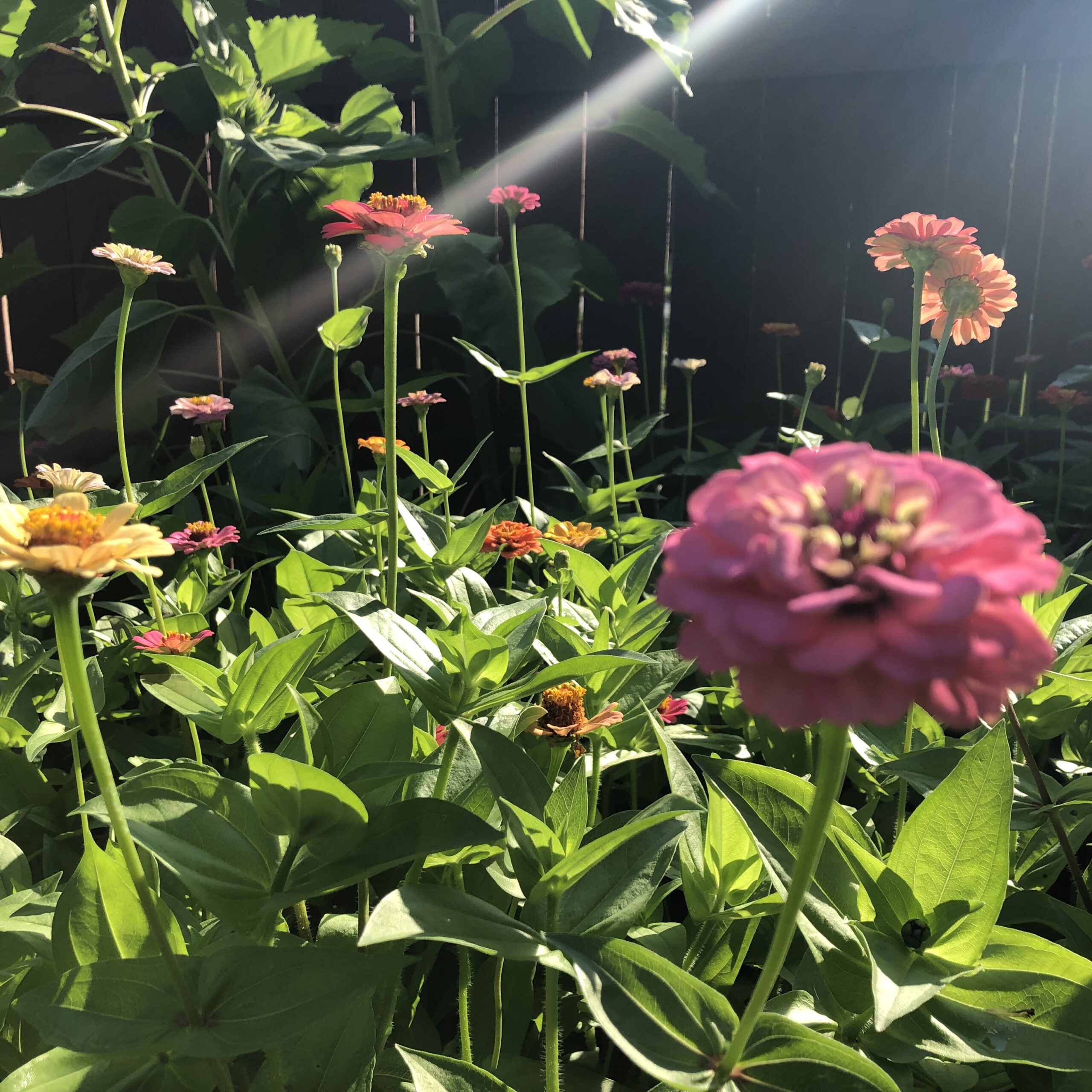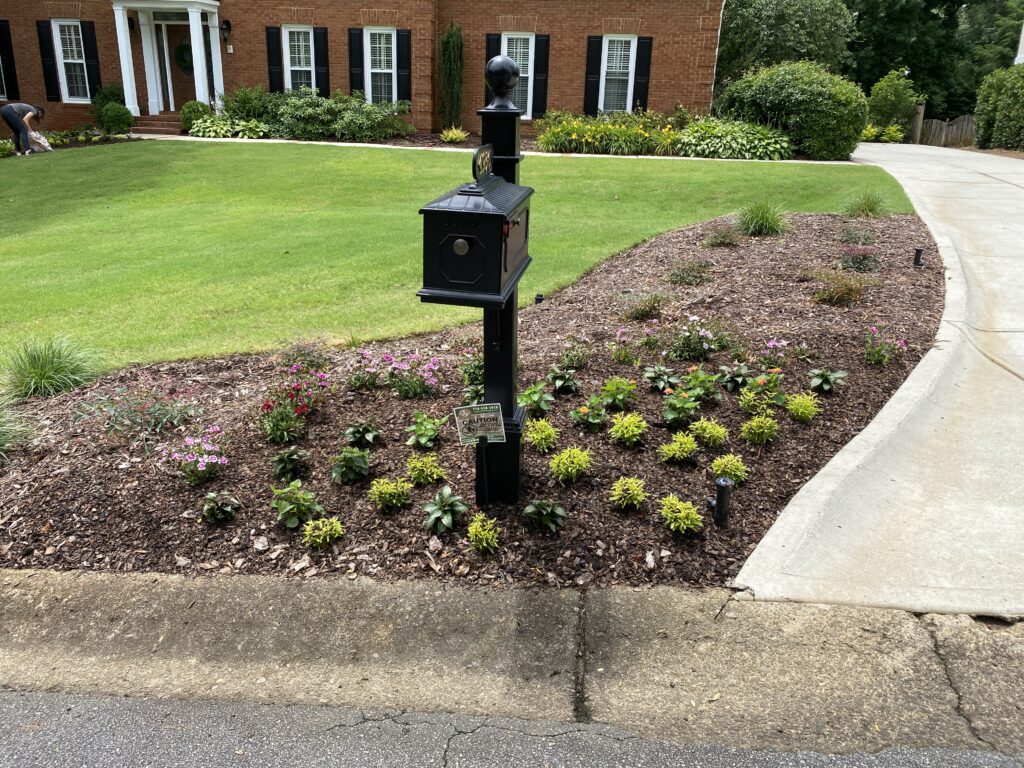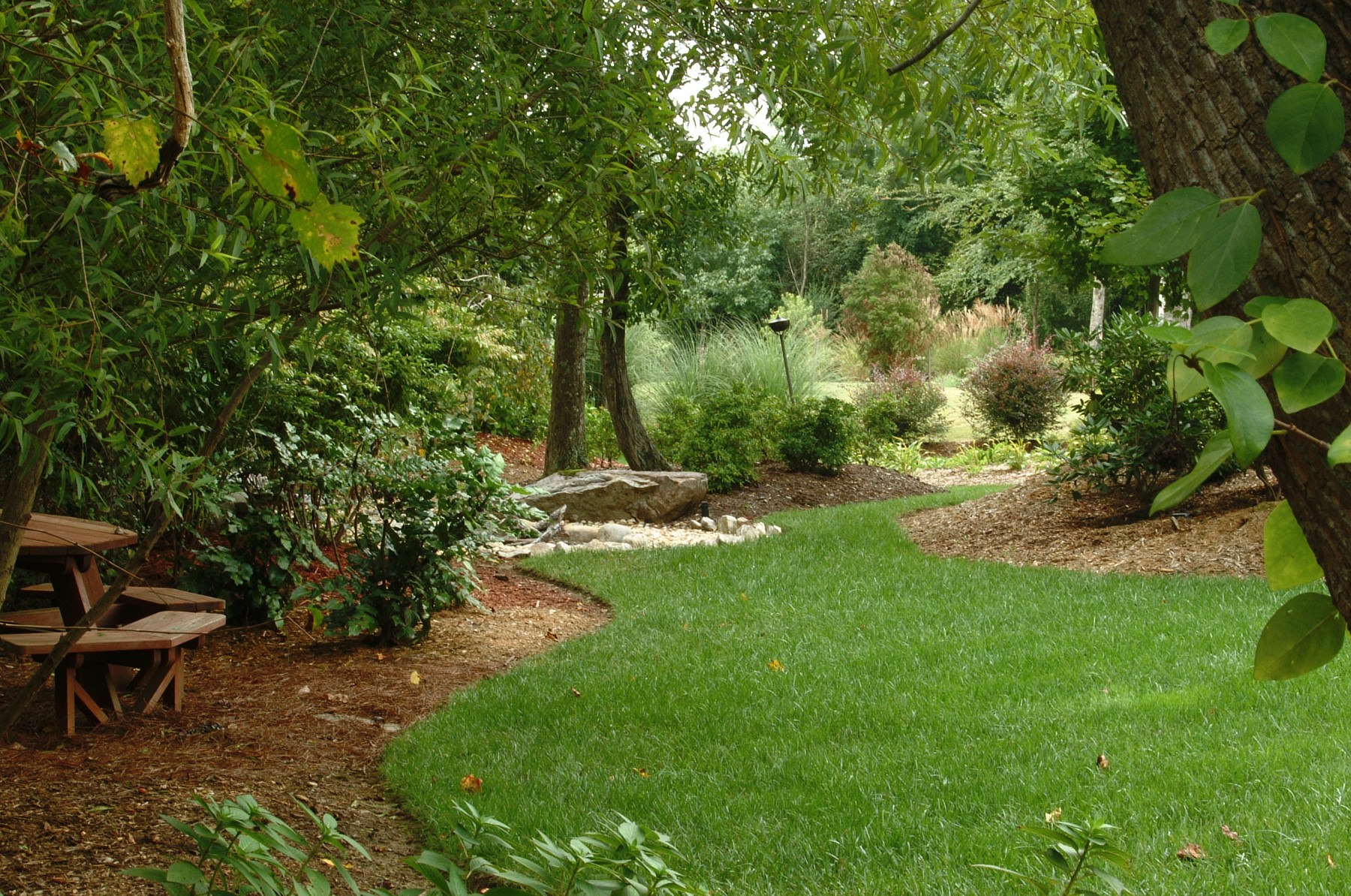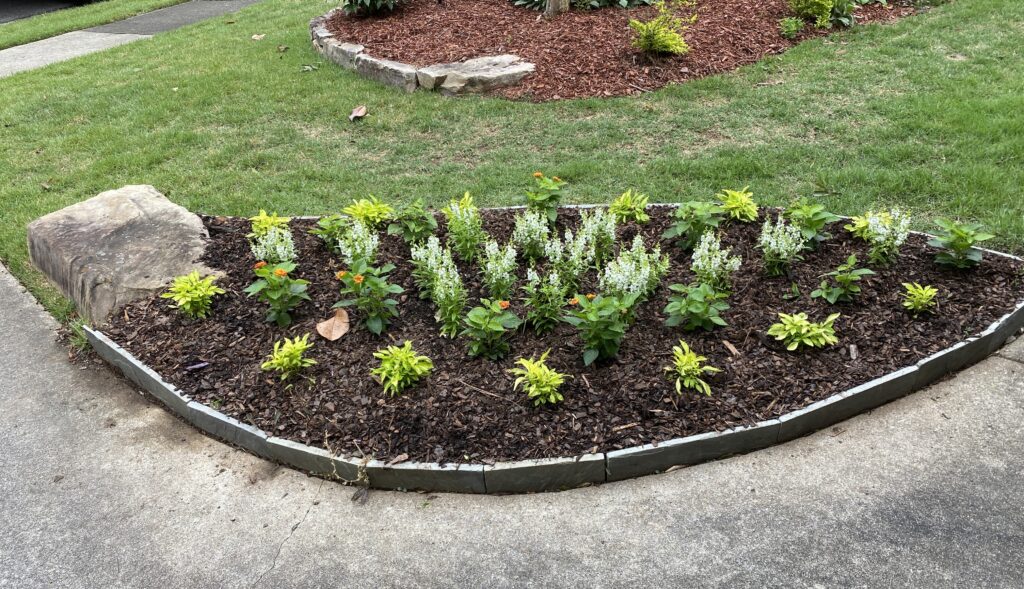If there’s one thing you can count on in the South during the summer, it’s that the days get incredibly hot. As we hit July and the heat turns muggy, maintaining a healthy garden, lawn and overall greenery can be challenging in Georgia. Summer weather is unpredictable, with weeks of no rain followed by a light shower, it can be important to prioritize extra care in the dry heat. At P.O.P.S Landscaping, we specialize in lawn care services and outdoor landscaping and are able to highlight some important summer garden tips to keep your home thriving through the scorching months.

Why are Summer Garden Tips Essential?
In Georgia, July weather can be muggy with August usually following with its own dry heat. This back and forth weather can test the reileince of plants and the patience of many homeowners. During the summer, proper lawn maintenance isn’t optional, with extra sun, nasty pests, and diseases all rising to the challenge to takeover your greenery. Wilting, browning, and many other plagues can depleted you soil of essential nutrients without proper care, making it harder for plants to thrive. Additionally, water scarcity during the summer demands efficient water management practices to ensure plants receive adequate hydration without wasting.
Whether you live in Marietta, or in the middle of Metro-Atlanta summer is busy season for lawn keepers everywhere. Check out our list of summer garden tips to help you can maintain a healthy, vibrant garden and lawn that enhances the beauty of your outdoor space!
1. Watering Wisely
As temperatures reach the high 90’s this summer, watering is crucial for Georgia Residents, but it’s not just about how much water you use—it’s about how you use it.
- Early Morning Watering: Water your plants early in the morning when temperatures are cooler, anywhere from 5:00 a.m. to 7:00 a.m. This method will reduce the chance of evaporation and ensure water reaches the roots before the heat of the day hits.
- Deep Watering: Instead of frequent shallow watering, aim for deep watering sessions. This encourages roots to grow deeper, making plants more drought-resistant.
- Bermuda and Zoysia, popular warmer-season grasses in Georgia, love the summer heat and direct sunlight but are vulnerable to drought and high temperatures. In the event of a heat wave, they need at least 1 inch of water per week!
- Mulching: Apply mulch around your plants and garden beds. Mulch retains moisture, keeps the soil cooler, and reduces water evaporation.
- No Evening Watering: Since the sun doesn’t remove excessive moisture from the grass blades at night, an evening irrigation routine would expose your plants to fungal diseases.
2. Choosing the Right Plants
Selecting the right greenery can make a significant difference in how well your garden survives the summer.
- Georgia Grasses: Bermuda, Zoysia, St. Augustinegrass, and Tall Fescue are some of the more popular seeded grasses for Georgia residents, often performing well in the south-eastern climate.
- Native Plants: Opt for native Georgia plants, which are well-adapted to the local climate and require less water and maintenance. Some excellent choices include Black-Eyed Susans, Purple Coneflowers, and Georgia Asters.
- Drought-Tolerant Species: Incorporate drought-tolerant plants such as succulents, ornamental grasses, and Mediterranean herbs like lavender and rosemary. These plants are designed to thrive in dry conditions.
3. Aearation and Fertilizing
Maintaining a lush lawn in the summer requires specific care techniques.
Aeration: Aerate your lawn in late spring or early summer to allow water, air, and nutrients to penetrate the soil more effectively. This helps grassroots grow deeper and stronger.
Roots won’t develop well if the soil is tight and compact. So, take out your core aerator (or a rented one) and drill small holes around the yard to allow oxygen, water, and fertilizers to easily access the root system. Lawn aeration is also an excellent way to:
- Prevent fungal diseases by making sure water doesn’t puddle on your lawn.
- Ensure fertilizers reach the roots as efficiently as possible.
- Help precious water be absorbed fast and deep during hot summer days.
- Encourage new grass to develop faster, easier, and healthier (if overseeding).
- Get out some grubs in the process.
Fertilizing: Apply a slow-release fertilizer in early summer to provide consistent nutrients to your lawn without over-stimulating growth, which can stress the grass. You can always integrate a chemical or organic fertilizer if need be! Nitrogen is essential for grass blade growth, while potassium and phosphorus are needed for root development and good resistance to drought and diseases. Follow these best lawn best practices:
- Don’t fertilize tall fescue in the summer. It forces growth and makes this cool-season grass vulnerable to heat and drought.
- Avoid fertilizing the lawn during a drought or while the grass is dehydrated, as it can stress the plants.

4. Soil Health
Healthy soil is the foundation of a thriving garden and lawn.
- Organic Matter: Enrich your soil with organic matter like compost or well-rotted manure. This improves soil structure, enhances moisture retention, and provides essential nutrients.
- Soil Testing: Conduct a soil test to determine its pH and nutrient levels. This helps you tailor your fertilization and amendment practices to meet your soil’s specific needs.
5. Pest and Disease Management
Hot, dry conditions can stress plants, making them more susceptible to pests and diseases.
- Integrated Pest Management (IPM): Use IPM practices to manage pests effectively. This includes monitoring for pest activity, encouraging beneficial insects, and using organic or chemical controls only when necessary.
- Disease Prevention: Water plants at their base to avoid wetting the foliage, which can promote fungal diseases. Remove any diseased plants promptly to prevent the spread of infection.
6. Smart Plant Placement
Strategic plant placement can help your garden cope with summer stress.
- Shade-Loving Plants: Plant shade-loving plants like hostas and ferns in areas that receive partial or full shade. This reduces their exposure to the harsh sun.
- Companion Planting: Practice companion planting by placing plants with similar water and sunlight needs together. This ensures efficient watering and care.
Hot and humid weather is heaven for fungal lawn diseases, so make a habit of observing your lawn weekly to check for signs of sickness. The most common Georgia lawn diseases you might deal with are:
- Fairy ring
- Gray leaf spot
- Leaf spot/Melting out
- Pythium blight or Pythium root rot
- Take-all root rot
7. Overseed & Irrigate
Grass has a lifespan of up to seven years, and it’s often thinned by extreme weather, pests, or diseases. Overseeding is an excellent way to keep the lawn dense and more resistant to drought, heat, and weeds.
Consider seeding in early summer for warm-season grasses such as Bermuda or Zoysia. If you need to overseed tall fescue or other cold-season grasses, include it as a task in your fall lawn care. The cooler weather will allow new seedlings to develop healthier and grow enough to have good resistance to heat until the following summer.
Another way to invest in efficient irrigation systems is to save water and keep your garden and lawn healthy.
- Drip Irrigation: Install a drip irrigation system to deliver water directly to the plant roots, minimizing water waste and reducing evaporation.
- Soaker Hoses: Use soaker hoses in garden beds to provide consistent moisture to the soil without wetting the foliage.

8. Pruning, Deadheading & Mowing
When summer heat spreads over Georgia, be sure to mow your lawn a half-inch taller to improve its resistance to high temperatures and drought. We reccomned you:
- Mow the lawn often enough to remove only ⅓ of the grass height each time. This helps the plant recover quickly and makes it less vulnerable to heat and lawn diseases.
- Trim the grass in the evening. Under the soft shelter of the night, it will have time to heal and recover.
- Don’t mow during drought. The grass is fragile and stressed, and it will recover more slowly.
- Keep the mower blades sharp. The grass heals faster with clean cuts and is less prone to diseases.
Regular pruning and deadheading can also help your plants and produce stay healthy during excessive heat!
- Pruning: Prune dead or diseased branches to improve air circulation and reduce the risk of pest infestations and diseases.
- Deadheading: Remove spent flowers to encourage new blooms and prevent plants from wasting energy on seed production.
9. Container Summer Garden Tips
If you have container plants, they require special attention during the summer.
- Choose the Right Containers: Use larger containers with good drainage to accommodate the plant’s root system and reduce heat stress.
- Watering Needs: Container plants often need more frequent watering than garden beds. Check the soil moisture regularly and water thoroughly when needed.
10. Harvesting and Maintenance
Regular maintenance and timely harvesting keep your garden productive.
- Harvesting: Pick fruits and vegetables as they ripen to encourage continued production and prevent overripe produce from attracting pests.
- Weeding: Keep your garden beds weed-free to reduce competition for water and nutrients.

Choose P.O.P.S Landscaping for Summer Garden and LawnCare!
Maintaining a beautiful and healthy garden and lawn in Georgia’s hot summer months requires strategic planning and consistent care. By prioritizing summer garden tips like proper watering techniques, choosing the right plants, maintaining soil health, and using efficient irrigation systems, you can ensure your greenery thrives despite the challenging conditions.
P.O.P.S Landscaping offers high-quality, cost-effective lawn maintenance services to keep your summer lawn and garden vibrant. From lawn maintenance to landscape design, P.O.P.S specializes in keeping your space healthy and beautiful in any season. If you need lawn care services in Marietta, Cherokee, North Cobb, North Fulton, East Cobb, or in the northern suburbs of Atlanta, Georgia, call us today!



